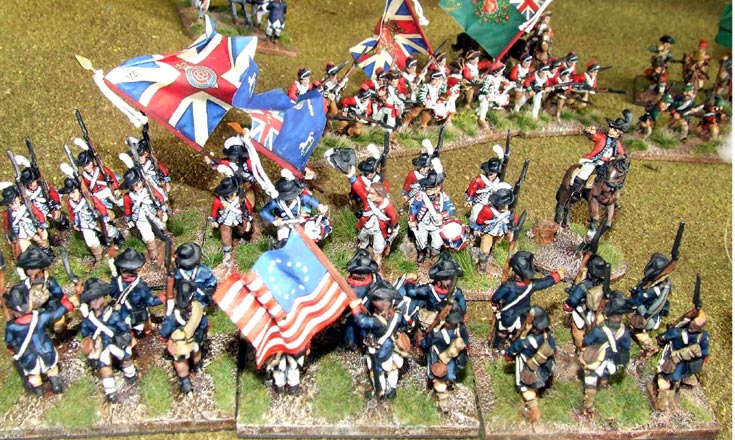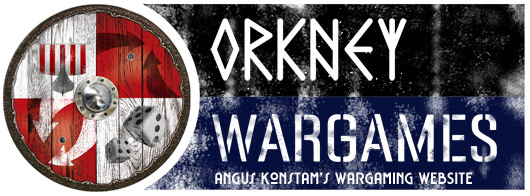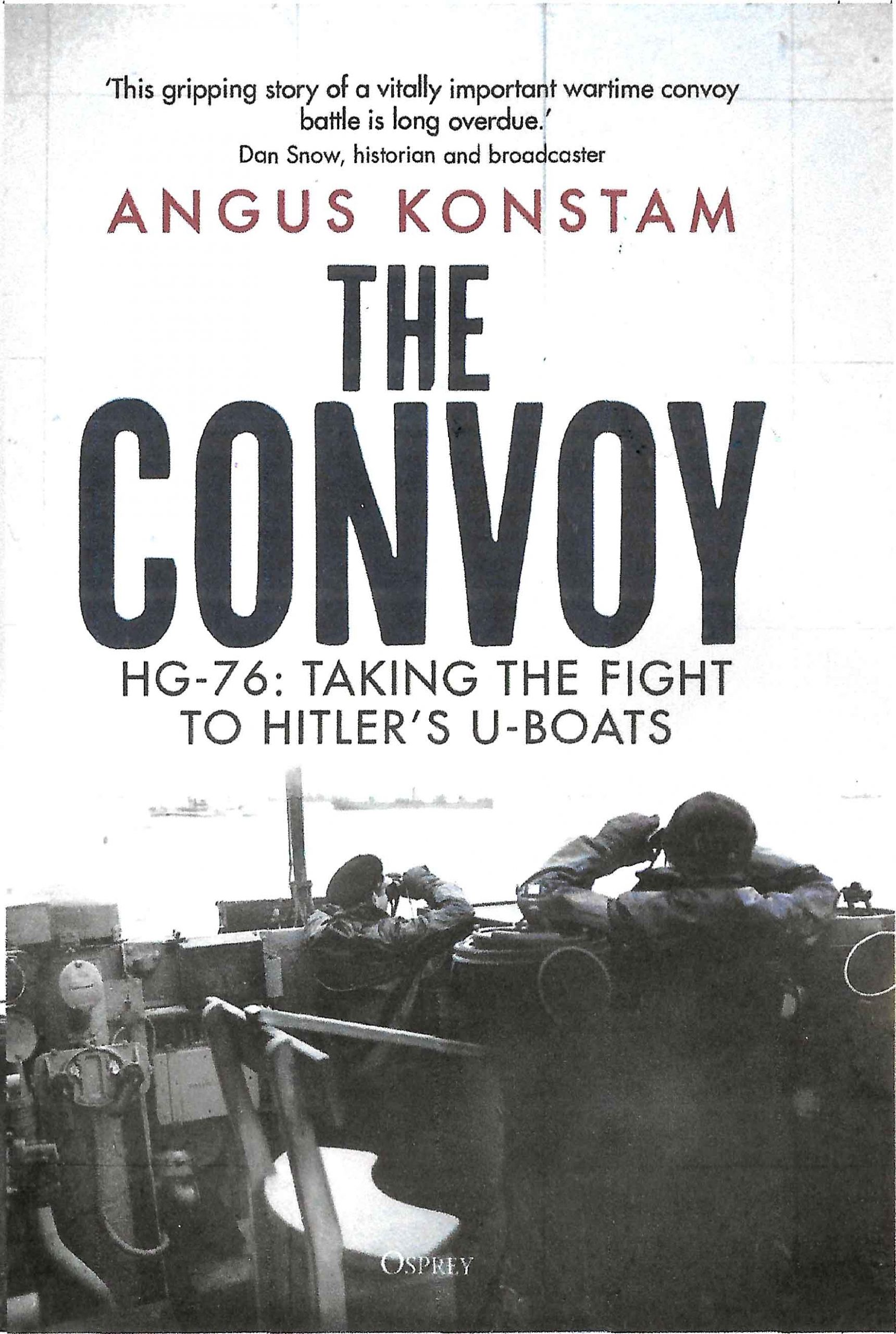
The Battle of Hobkirk’s Hill, 1781
9th June 2011, Comments Off
The American War of Independence, British Grenadier, 28mm
This small game was staged in Orkney, largely to christen some of my new AWI units, including the Volunteers of Ireland. Everyone needs a sacrificial Irish unit in their army… The real battle was fought outside Camden in April 1781.The American Rebels were trying to drive the British from the hinterland of the Carolinas, but it was Lord Rawdon’s small British force that struck first. I say British, but most of his troops were American Loyalists, many off them of dubious quality. In the real battle Rawdon’s motley force rolled up the Americans and won the day. Would history repeat itself? The battle began when the formed British line emerged from the woods in front of the American left flank, held by two Maryland regiments, and a battery of 6-pounders. The Marylanders had no option but to fire at will, then brace themselves for a charge. Over on the American right, another two regiment brigade of Virginians failed all its attempts to change orders, meaning that the troops sat there, until the brigade commander got his act together (or rolled the right dice).
The battle began when the formed British line emerged from the woods in front of the American left flank, held by two Maryland regiments, and a battery of 6-pounders. The Marylanders had no option but to fire at will, then brace themselves for a charge. Over on the American right, another two regiment brigade of Virginians failed all its attempts to change orders, meaning that the troops sat there, until the brigade commander got his act together (or rolled the right dice). On the far right the 64th Foot went in with the bayonet, and shrugged off the poor musketry of the 1st Maryland and charged home. On the left of the British regulars the King’s Americans did the same, after an initial check to their advance from the musketry of the 5th Maryland. Further to the left the New York Volunteers (militia quality, despite their fancy uniforms) were halted and then forced to retire by canister fire from the American battery. That’s roughly the situation in the picture above.
On the far right the 64th Foot went in with the bayonet, and shrugged off the poor musketry of the 1st Maryland and charged home. On the left of the British regulars the King’s Americans did the same, after an initial check to their advance from the musketry of the 5th Maryland. Further to the left the New York Volunteers (militia quality, despite their fancy uniforms) were halted and then forced to retire by canister fire from the American battery. That’s roughly the situation in the picture above. The 64th won their melee, forcing the 1st Maryland to rout. They were promptly charged by Washington’s Dragoons, but thanks to some poor die rolling the cavalry failed to charge home, and were whittled down by musketry. Soon the survivors were fleeing from the field. Ignoring the harassing fire from American skirmishers the 64th then wheeled to the left, to threaten the flank of the remaining Maryland unit. Faced with troops to front and flank the Marylanders were forced to retire, as did the North Carolina militia unit which now constituted the sole American reserve. At that point the American player failed a brigade morale check, prompted by the loyalist Volunteers of Ireland regiment charging the American battery in the flank, and capturing the guns. It now looked like the battle would end in a sweeping American victory, with only the Virginians standing in the way.
The 64th won their melee, forcing the 1st Maryland to rout. They were promptly charged by Washington’s Dragoons, but thanks to some poor die rolling the cavalry failed to charge home, and were whittled down by musketry. Soon the survivors were fleeing from the field. Ignoring the harassing fire from American skirmishers the 64th then wheeled to the left, to threaten the flank of the remaining Maryland unit. Faced with troops to front and flank the Marylanders were forced to retire, as did the North Carolina militia unit which now constituted the sole American reserve. At that point the American player failed a brigade morale check, prompted by the loyalist Volunteers of Ireland regiment charging the American battery in the flank, and capturing the guns. It now looked like the battle would end in a sweeping American victory, with only the Virginians standing in the way. That was when it almost went to pieces for the British. Col, Stuart commanding the now slightly-battered British first line had his own bad luck with the order-changing dice, and while his troops milled around on the hill, the Americans managed to reform their line on the western crest. In closing with them the King’s Americans were shredded by musketry, and forced to retire, taking no further part in the fight. An attempt to ride down the American skirmish screen on the Virginia’s right flank came to naught as the loyalist New York dragoons were forced to retire after suffering too many casualties.
That was when it almost went to pieces for the British. Col, Stuart commanding the now slightly-battered British first line had his own bad luck with the order-changing dice, and while his troops milled around on the hill, the Americans managed to reform their line on the western crest. In closing with them the King’s Americans were shredded by musketry, and forced to retire, taking no further part in the fight. An attempt to ride down the American skirmish screen on the Virginia’s right flank came to naught as the loyalist New York dragoons were forced to retire after suffering too many casualties. That left the battered 64th and the Volunteers of Ireland to save the day, supported by the unenthusiastic militiamen of the loyal South Carolina Provincials. Still, it was essentially three units against three now, with the 64th lining up against the survivors of the Maryland brigade, the Irishmen facing the 4th Virginia, and the rest of the Virginians being screened by the loyalist militia.
That left the battered 64th and the Volunteers of Ireland to save the day, supported by the unenthusiastic militiamen of the loyal South Carolina Provincials. Still, it was essentially three units against three now, with the 64th lining up against the survivors of the Maryland brigade, the Irishmen facing the 4th Virginia, and the rest of the Virginians being screened by the loyalist militia. It fell to the Volunteers of Ireland to save the day. The 64th refused to charge, and while both they and the loyalist militia were content to fire at the enemy, the Irishmen went in with the bayonet. They suffered heavily from American fire, but through more audacity than ability they slammed into the Virginians and broke them. That was essentially the end of the game, as the surviving Americans failed their brigade morale, and retired from the field.The British had won their victory, but the cost was high, with almost 2/5ths of their small army falling in the battle. This, as it turned out, was pretty much what happened in the real engagement, although the butcher’s bill wasn’t quite so high. the main thing though, was that I managed to “blood” several of my new units, particularly my sacrificial Irishmen, who made two key charges, and saved the day for the British cause. Pints of Guinness all round for the lads pictured below…
It fell to the Volunteers of Ireland to save the day. The 64th refused to charge, and while both they and the loyalist militia were content to fire at the enemy, the Irishmen went in with the bayonet. They suffered heavily from American fire, but through more audacity than ability they slammed into the Virginians and broke them. That was essentially the end of the game, as the surviving Americans failed their brigade morale, and retired from the field.The British had won their victory, but the cost was high, with almost 2/5ths of their small army falling in the battle. This, as it turned out, was pretty much what happened in the real engagement, although the butcher’s bill wasn’t quite so high. the main thing though, was that I managed to “blood” several of my new units, particularly my sacrificial Irishmen, who made two key charges, and saved the day for the British cause. Pints of Guinness all round for the lads pictured below…

